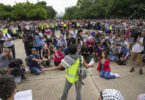Yossi Mekelberg
For any decent human being, regardless of religion, ethnicity, gender or age, the horrors we have been witnessing since Oct. 7 in Israel and Gaza are shocking and terrifying. The very notion that people can willingly inflict such unimaginable pain and suffering on their fellow human beings – pain and suffering that no religion, ideology or political objective could remotely justify – questions the very notion of humanity and what it means to be human.
And despite all the bloodshed and destruction, there are still those on both sides who justify these atrocities and believe that they are on the journey to victory, while the truth is that they are taking us all on the road to hell. The brutality of what Hamas committed on that horrific October day is well documented and responding to it and preventing such threats in the future is understandable, but this cannot justify Israel’s mass killings of Palestinian civilians in Gaza.
Worse is that there is a segment of Israeli society that sees the war as a license to release their darkest, most sinister inner political selves and openly call for mass atrocities against the Palestinians. The far right, which is a combination of messianic-religious and secular ultranationalists, has come out of the woodwork to promote, with no shame and no qualms, the committing of war crimes and crimes against humanity.
Something of a conjunction of incitement to genocide and sheer idiocy was the suggestion last month by Jerusalem Affairs and Heritage Minister Amichai Eliyahu that dropping a nuclear weapon on the Gaza Strip was “an option.” His “reasoning” for considering this as an acceptable option was that there are “no noncombatants in Gaza.” Admittedly, Prime Minister Benjamin Netanyahu responded with the understatement of the year, when he declared that Eliyahu’s comments were “divorced from reality,” but what he should have done was the decent thing and sacked him from his government even before the interview was over. This was merely a ticking off; a nutcracker when a sledgehammer was required. I do not suspect that there are any in Israel who remotely believe that a nuclear strike is an option, given its moral and practical implications, but the very fact that a government minister has expressed a view that the entire population of Gaza is blameworthy and hence deserves to die is chilling. And Eliyahu did not stop there. He suggested, as have some other of his colleagues, that humanitarian aid should not be allowed into the Gaza Strip; in other words, if an atom bomb cannot be dropped, then mass starvation and disease will do the trick.
As a side note, Eliyahu implied – and perish the thought – that Israel possesses nuclear military capability, an admission which in the past has carried with it a lengthy prison term. That is something for later, but his explicit suggestion of eliminating the entire Palestinian population for the sake of Israel’s security is something that needs urgent discussion. As wacky as these remarks may have been, they are not a million miles away from a suggestion made by another minister, security Cabinet member and former Shin Bet director Avi Dichter. When he was asked whether what is currently taking place is a “Gaza Nakba,” Dichter replied: “Gaza Nakba 2023. That’s how it’ll end.”
Nothing is more terrifying for Palestinians to hear, especially from a senior member of the security Cabinet, that they might have to relive the most horrific epoch in their history: the mass displacements and dispossessions of 1948. As in the case of Eliyahu’s remarks, it might be that some Israeli politicians suffer from a judgment bypass whenever a microphone is put in front of them, but I suspect that these have been their long-held views that were only waiting for the “right time” to surface, and that they felt this war was that time. Nevertheless, it is not only live interviews that are giving a platform for Israeli ministers to unburden themselves about their “vision” for Gaza. Gila Gamliel, who as the current minister of intelligence should have resigned the day after Oct. 7, preferably accompanied by Netanyahu, wrote for The Jerusalem Post her opinion of what should be done with the population of Gaza after the war. Unlike Dichter’s remarks, which were a full-on advocacy for another Nakba, here was something of a Nakba-lite, although equally disturbing.
Part of Gamliel’s piece was an unsubstantiated attack on UNRWA, claiming that it “has done zero to help the Palestinian people” – a remark that represents sheer ignorance combined with the distortion of a difficult reality in which this UN organ operates to provide humanitarian aid under the most horrendous of circumstances. It has already lost at least 111 of its people to the war, yet it still provides, under fire, basic needs and shelter for hundreds of thousands in their overcrowded facilities. Gamliel’s attack on UNRWA was mainly aimed at promoting her so-called plan to deprive the organization of its budget and use it instead to “help” the people of Gaza to “resettle” in other countries. How had we never thought of this brilliant idea until now? Obviously, Gamliel has too much of a humanitarian soul to suggest a forced expulsion, yet she does not suggest that the people she wants to resettle are going to be consulted or who is going to absorb them. From being a failed intelligence minister, she has reinvented herself as the “Minister of Palestinian Emigration” or, to put it more bluntly, the “Minister of Nakba 2.0.”
Times of crisis and conflict can bring the best out of humanity, with people showing their caring and empathetic nature. But as far as some of Israel’s right wing is concerned, this war is showing them at their very worst. In the West Bank, groups of extremist settlers are taking advantage of the situation, while the eyes of the world are on Gaza, to intensify their violence against Palestinians. And one of their most prominent leaders, National Security Minister Itamar Ben-Gvir, is even handing out weapons to them.
This not only risks their increasing use against Arabs, but also the creation of a militia that will resist any concessions in a future peace agreement. There is no room for complacency regarding what at this point may appear to be the extreme views of a minority of Israeli politicians and ordinary citizens. It should not be assumed that such views will not take hold in wider segments of Israeli society. Hence, these ideas should not be taken as simply anecdotal and of no consequence, but rather responded to in all seriousness and nipped in the bud.







